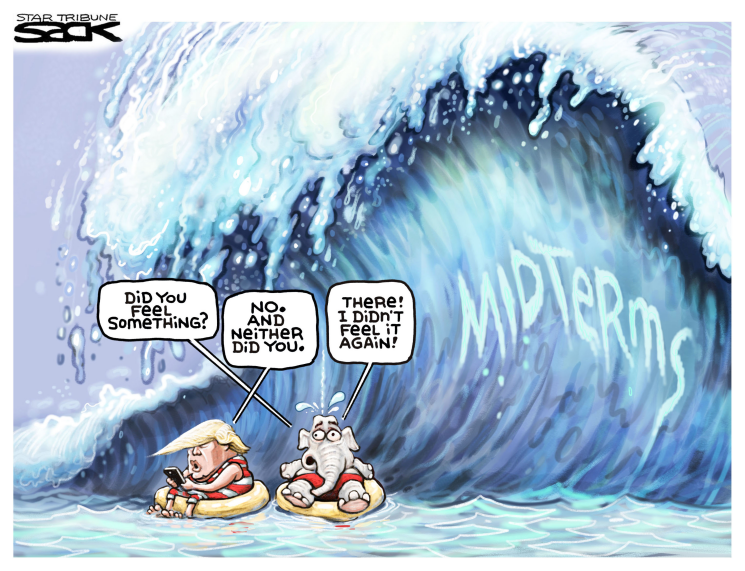Don’t Get Too Cocky, Democrats
by Carl Golden
Of course, scores of the same party apparatchiks were confident they'd spend the evening of Nov. 8, 2016, dancing the night away on shards of glass from the ceiling shattered by Hillary Clinton on her way to the White House.
The party is increasingly confident that a combination of the normal mid-term losses experienced by the controlling party, dissatisfaction with President Trump, and the void left by the voluntary departures from the House of Representatives of some 40 Republican members will translate into a return to Congressional dominance.
Given the unceasing turbulence in the White House and the steady stream of news accounts of the investigation by Special Counsel Robert Mueller into allegations of election meddling by Russian operatives it will, when added to the other political burdens, prove too much to bear and crush enough Republicans that divided government will return.
There are, though, signs Democrats are leaning too far over their skis and may want to delay booking hotel ballrooms for victory celebrations.
Several recent polls have shown a narrowing of the gap in the so-called generic survey which pits party against party rather than candidate versus candidate.
The recent ABC/Washington Post poll showed a healthy 10-point lead by Democrats had shrunk to four points (a margin of error difference), and President Trump's approval rating has risen to just over 40 per cent, similar territory for previous presidents at the same stage.
With more than six months before Election Day, there is ample time for a more competitive environment to develop and equally ample time for some disaster to befall the Trump administration and drag Republican congressional candidates down with it.
While Democrats argue that the polls don't reveal the depth of voter enthusiasm in their favor, they gloss over the ideological schizophrenia which afflicts their party.
The committed left is pushing and pulling the party toward Bernie Sanders-like progressivism while the moderate wing is warning that leaning too far in that direction was a major factor in its 2016 debacle.
To be successful, they contend, Democratic candidates need more than a simple anti-Trump posture.A coherent, credible message is crucial, one that appeals to Democratic voters who abandoned the party in 2016 and who could again if they perceive their choice as between left wing fringe policies and gut level issues and concerns.
The special election victory last month of Democrat Conor Lamb in a southwestern Pennsylvania district carried handily by Trump is testimony to the effectiveness of the gut level strategy.
Not surprisingly, Republicans are expressing optimism about the prospects of retaining control of Congress while conceding their majority will likely shrink.
They believe the surging national economy, propelled by the tax reform/tax cut legislation, is a powerful message capable of overcoming the cascade of investigatory revelations and allegations - unsubstantiated thus far - of the Trump campaign playing footsie with the Russians.
Declining unemployment, rising wages, expanding job opportunities and more earned income in the pockets of workers as a result of tax reductions are far more compelling in terms of voter appeal than attempting to unravel or defend the tangled mass of charges and counter charges of ethical misconduct.
Republicans are convinced that voters will credit and reward them for nurturing a strengthened national economy and will put aside their misgivings about the President's missteps or the conduct of his business or social life.
The closing of the gap in party support and the President's uptick in approval - modest though it is - provides some justification for the Republican strategy and createscautious optimism in the initial stages of the national campaign.
There are, to be sure, a boatload of unknowns which could easily and adversely affect Republican hopes.If additional indictments are brought by Mueller, for instance, against individuals close to the President or if the investigation reaches into the upper levels of the White House, the fallout would be devastating.No amount of economic good news could blunt the impact.
Democrats could realize their hopes that the Republican party landscape will resemble nuclear winter on the morning after the election.Or, they could wake up with an Olympic-sized hangover brought on by a failure to heal a divided party and a second consecutive blown opportunity.
-
Copyright 2018 Carl Golden, distributed exclusively by Cagle Cartoons newspaper syndicate.
Carl Golden is a senior contributing analyst with the William J. Hughes Center for Public Policy at Stockton University in New Jersey. You can reach him at cgolden1937@gmail.